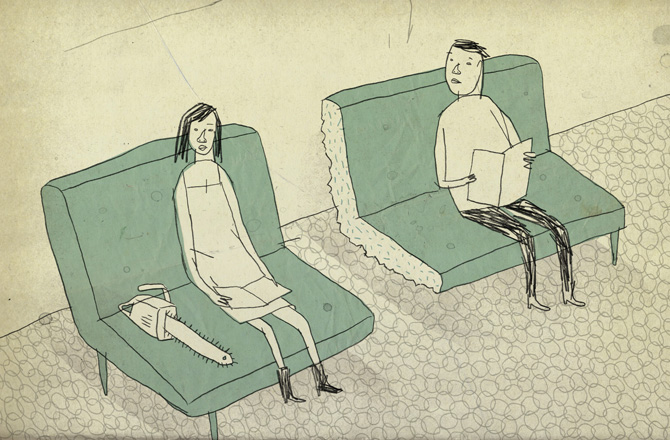
11 Questions to Ask Before Getting a Divorce
Common sense suggests that asking the right questions before getting married can make for a better union, but rarely is the other side of the coin examined.
That could be because, by the time the prospect of divorce surfaces, spouses may already be in a stressful frame of mind, and in no mood for a game of 20 — or even 11 — questions.
That is a mistake, said Nancy Colier, a psychotherapist in Manhattan. Even if the ultimate decision is to dissolve the marriage, asking the right questions before contacting a lawyer or mediator, and perhaps with the assistance of a marriage counselor, may prove worthwhile.
The New York Times asked some people well versed in the challenges and difficulties of marriage and divorce to suggest questions that may make a split more amicable, or even save the union. Here are 11 of their ideas:
1. Have you made clear your concerns about the relationship?
“You may think that you have communicated, but your partner may not have really heard,” said Sherry Amatenstein, a marriage therapist in Manhattan and Queens and the author of books on relationships.
“Research shows that people hear only between 30 to 35 percent of what is said to them,” she said, “because we’re so full of ‘I’m going to say this to them.’”
If, for example, you believe your spouse is not making you a priority and, say, fails to spend time with you, this behavior can’t be changed unless he or she is aware of your concerns.
“You want to be really clear that you’ve given it everything in terms of speaking truth to your partner,” Ms. Colier said. That could help in healing if the marriage dissolves, she said, because you’ll know that you have done everything possible to make the relationship work.
2. Do you and your spouse have shared expectations about the roles you play in the relationship?
“Sometimes the problem may be as simple as not understanding how your partner expects you to behave,” said Hope Adair, who, along with her ex-husband, was featured in a 2014 Times column that explored marriages that have failed. “It’s like, ‘This is what husbands or wives do and you’re not doing that.’”
If, for instance, one person expects the other to take the lead in managing finances, and he or she would prefer not to, problems can result.
3. If there is a way to save the marriage, what would it be?
The Rev. Kevin Wright, the minister of education at the Riverside Church in Manhattan, suggests this exercise: On one side of a sheet of paper or computer screen, make a list of what you think you need to do to save the marriage, and on the other side, what your spouse needs to do. And make sure your spouse does the same. It’s important that both of you perform this exercise. Otherwise, he said, “this question can very easily become a question all about what the other person needs to do.”
4. Would you really be happier without your partner?
“You have to look fiercely and realistically at whether what you’re getting in the relationship is worth what you’re giving up,” Ms. Colier said. “Perhaps your spouse doesn’t interest you as a sexual partner as much as you would want, but maybe your spouse’s co-parenting skills, willingness to help with everyday chores or companionship can offset the negative and make the trade-off worth it.” Getting a clear idea of what is most important in your life can make the decision of whether to stay in the marriage less overwhelming.
5. Do you still love him or her?
Even if the answer is yes, divorce may still be the right path. “There are a lot of reasons that people decide they can’t stay married, but our emotions aren’t wired on an on/off switch,” said Wendy Paris, a writer specializing in relationships. “Some of the anger we see in divorce comes from the fact that we do still feel love for this person, and can feel hurt, unloved in return, or unvalued.”
6. What is your biggest fear in ending the relationship?
“For some people, it might be the fear of being single again — the fear of being alone for the rest of their life,” Ms. Colier said. “For others, it is the fear of losing a sense of physical intimacy.” An understanding of what those fears are may help in deciding whether divorce is the best way forward, she said.
7. Are you letting the prospect of divorce ruin your self-image?
The realization that divorce may be near often makes people feel like failures, Ms. Paris said. Instead of dwelling on how you may have stumbled, look at the relationship’s end in “a more empowering way,” she suggested, concentrating on what you did right. For example, “I have given intimacy a real try,” or “I am trying different options to figure out what is the best for everybody.”
8. How can a divorce be handled to minimize the harm on the children?
“If you’re really miserable together, getting divorced is the best thing to do,” Ms. Amatenstein said. “But you will always be parents together. You are still going to be in each other’s lives. You need to think about how you’re going to do this and refrain from using the kids as cannon fodder.”
9. Are you prepared for the financial stresses divorce may bring?
“What I recommend to people is that they start thinking about the financial as early in the process as possible,” Ms. Colier said. “That means meeting, if you can, with a financial adviser, talking to lawyers and writing down what this is going to cost. There is so much that is going to change — and so much fear. It’s important to feel grounded with as many financial facts as possible. You’ll feel safer that way.”
10. Am I ready to handle the day-to-day details of living that my spouse took care of?
“We prepare for most other major transitions, but divorce can seem to erupt like a volcano,” Ms. Paris said, “and our lack of preparation adds to the chaos.”
Understand that you may find yourself paying bills or figuring out taxes for the first time in years. If there are children, who will take the lead in keeping track of their activities calendar?
11. How do I keep from making the same mistake the next time around?
Understand that the problem may be you, not the particular marriage. If you are bored in a relationship, you may find yourself bored in another one, too, said Erika Doukas, a clinical psychologist in private practice in Manhattan and Larchmont, N.Y. If you quarrel with your spouse over whose relatives to visit during the holidays, the same conflict may reappear in a subsequent marriage. Dr. Doukas said spouses who were able to realize that they contribute to marital problems could sometimes change course and possibly save a relationship or, failing that, make a future one more long lasting.
Share this story
-
Awesome https://shorturl.at/2breu
-
Good https://shorturl.at/2breu

